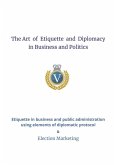The Art of Governance: Leadership, Strategy, and Vision for Global Influencers This book provides a comprehensive guide to effective and transformative leadership in an increasingly complex and polarized world. It offers actionable insights for leaders across industries, politics, and global affairs, emphasizing the interplay of ethics, vision, strategy, and legacy. Each chapter delves into a key aspect of governance, presenting historical examples, philosophical reflections, and practical strategies for addressing modern challenges. Key Themes and Takeaways Leadership today is about navigating unprecedented challenges like climate change, geopolitical tensions, and societal polarization. Effective leaders must combine ethical principles with innovation and adaptability to foster equity, balance, and sustainability. Governance requires precision and flexibility. Leaders must balance competing priorities-economic growth with environmental sustainability, individuality with unity, tradition with progress-to build systems that are resilient and inclusive. Ideas drive progress, but their transformative potential lies in how they are implemented. Positive ideas inspire equity, inclusivity, and collective progress, while negative ideas rooted in division or fear hinder growth and sow discord. Leaders must champion ideas that unify and innovate. Governance thrives on accountability and fairness. Leaders must create systems that monitor power, address injustices, and balance short-term goals with long-term sustainability. This ensures trust, stability, and equitable resource distribution. Ideologies shape societies and global dynamics, often influencing regions and generations far beyond their origins. Leaders must manage ideological divides responsibly, fostering collaboration instead of conflict, and adapting ideas to diverse contexts. True alliances are based on mutual respect and equitable benefits. Leaders must prioritize transparency, inclusivity, and shared goals to create partnerships that endure. Exploitative alliances may yield short-term gains but ultimately erode trust and stability. The future depends on leaders' ability to manage resources responsibly, balancing economic development with environmental stewardship and social equity. Investing in education, renewable energy, and inclusive systems ensures resilience for future generations. Ethics is the foundation of effective leadership in divided societies. Leaders must prioritize integrity, transparency, and empathy to bridge divides, rebuild trust, and foster collaboration. Ethical leadership transforms polarization into opportunities for unity and progress. An idea becomes transformative when it evolves into a movement. Leaders must articulate a clear vision, mobilize grassroots support, build alliances, and sustain momentum. Movements amplify collective power and drive systemic change, addressing critical societal challenges. True leadership is measured by the legacy it leaves. A leader's enduring impact lies in the systems, values, and progress they inspire. By prioritizing vision, integrity, and sustainability, leaders create a foundation for future generations to thrive. Leadership is not about wielding power but about inspiring progress, empowering others, and creating systems that endure. Leaders who navigate challenges with courage, adaptability, and ethical integrity leave behind a legacy that shapes a better, more equitable world. The lesson is clear: Leadership is both an art and a science. Its ultimate purpose is to serve humanity, ensuring that the actions of today create a foundation for tomorrow's prosperity, harmony, and hope.
Hinweis: Dieser Artikel kann nur an eine deutsche Lieferadresse ausgeliefert werden.
Hinweis: Dieser Artikel kann nur an eine deutsche Lieferadresse ausgeliefert werden.








